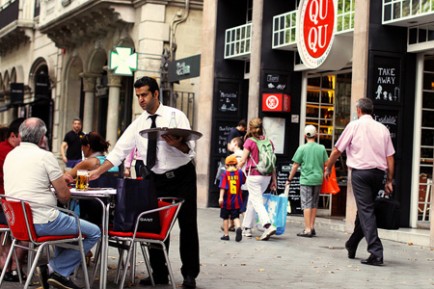
Spain’s long working hours often suit the country’s laid-back style, but is that part of the problem?
The Catalan government has vowed this week to bring an end to the long working hours that many Catalans currently endure, seeking to bring the region more in line with the rest of Europe.
Spain’s famously long working day – which for many begins a little after 8am, is interrupted by a long lunch break at around 2pm and then continues between 4pm and 8pm – has often been touted as one of the reasons why the economy has struggled in recent years…
Far from working longer hours making the country more economically productive, many experts fear that Spaniards are simply too tired to function to the best of their ability. By way of contrast, the average Spaniard works around 300 hours more per year than the average German, and sleeps one hour less than the European average.
In 2013, the government floated the idea of bringing Spain in line with Greenwich Mean Time (GMT), rather than the current Central European Time (CET) – a plan that, as a quick glance at a map will tell you, makes a lot of sense – but is yet to be implemented.
Some argue that this skewed-clock living has suited Spain for many years, forcing Spaniards to work and play a little later than the rest of the continent, which, given the heat of a Spanish summer, is no bad thing.
But Catalonia, ever keen to differentiate itself from the rest of Spain, is poised to listen to the demands of industry lobbyists who claim that a shorter working day will trigger a chain of positive outcomes for the region, including greater productivity, fewer workplace accidents and, interestingly, a more equal division of household chores among couples and family members.
“We’ve shown why this needs to be done, now we’re tackling the how,” said Fabian Mohendano, one such campaigner.
“Because of a great historical error [when General Francisco Franco aligned Spain’s clocks with fascist ally Germany’s in 1942], in Spain we eat at 2pm, don’t have dinner until 9pm but, according to the position of the sun, we eat at the same time as the rest of Europe – 1pm and 8pm,” said Nuria Chinchilla at the height of last year’s debate.
“We are living with 71 years of jetlag and it’s unsustainable.”
However, without Madrid’s official backing, the Catalan government could find it difficult to implement binding and effective reforms. Mohedano pointed out that there is tension between Catalonia’s proposals on prime-time TV scheduling, school hours and commercial watershed hours, and the campaigner sees further contention over this issue.
“Ten years ago we started talking about this and nobody paid attention, but now at least it appears that there is a debate at last,” he said.
 en
en



 Vlaams-Nederlands
Vlaams-Nederlands
0 Comments
Leave a Comment
DISCLAIMER
The opinions and comments expressed by contributors to this Blog are theirs alone and do not necessarily reflect the views of VIVA Homes Under the Sun Ltd, any of its associated companies, or employees; nor is VIVA to be held responsible or accountable for the accuracy of any of the information supplied.
Have you got something to say?